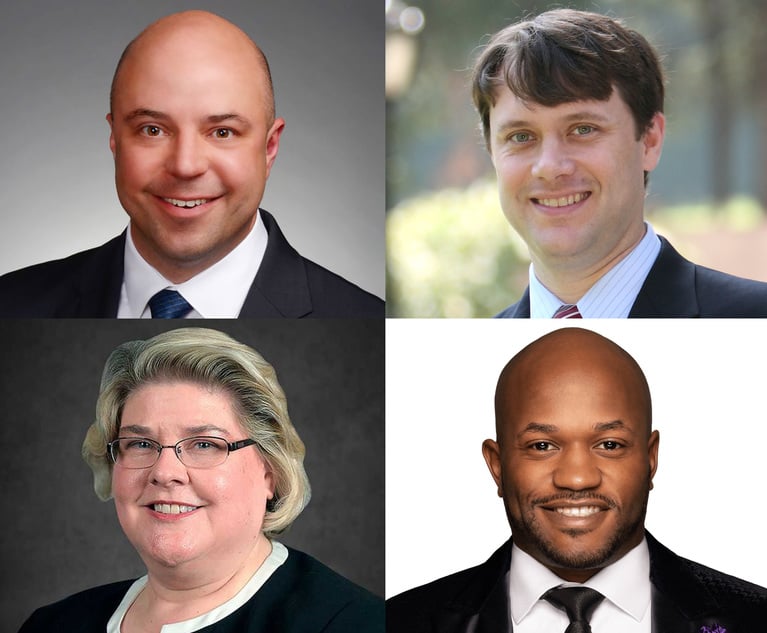 (Photo: Shutterstock.com)
(Photo: Shutterstock.com)Arbitration Is a Viable Option for Family Law Cases
Arbitration provides a sense of privacy for families who simply don't want their finances, business endeavors or emotional issues to be subject to a public courtroom.
September 23, 2019 at 11:00 AM
6 minute read
More and more family law practitioners are turning to arbitration as an alternative to the courts. With family law cases becoming more complex and specialized, the ability to have a bit more control over the hearing process, time needed, and even costs, warrants considering arbitration as a viable option.
 Denise VanLanduyt (Courtesy photo)
Denise VanLanduyt (Courtesy photo)
Arbitration offers the ability to schedule not only the date of your hearing but also the length of time a party may need in order to fully present their case. In the growing congestion of our superior courts, time or a guarantee of time is invaluable, yet often a scarce resource in the family law arena. Having a bit of input over scheduling can also be an accommodating feature for witnesses who are schoolteachers, family counselors and/or individuals or experts who may reside out of state.
Arbitration also provides a sense of privacy for families who simply don't want their finances, business endeavors or emotional issues to be subject to a public courtroom. This can be especially true for families who identify, or maybe have children who identify, as part of the LGBTQ+ community. Despite changes in the law on marriage equality, and now the equitable caregiver act, found at O.C.G.A. §19-7-3.1, families, signed into law this year, families still express concern for how they may be treated by the judicial system. For these families, being able to select the arbiter may address a client's concerns regarding bias and prejudice.
Family law attorneys should also take a lesson from our colleagues in the complex civil litigation field when it comes to arbitration. Having the ability not just to schedule but seek out arbiters who are experts in the field of family law can prove to be beneficial to the process. As family law becomes more and more nuanced, especially with complex concepts of psychology and finances intertwined, it may be wise to consider who is hearing the case.
Since 2007, matters of custody have been authorized to be heard in arbitration. O.C.G.A. § 19-9-1.1. With arbiters able to hear custody matters, this method of ADR opens the possibility of arbitrating custody issues on a temporary basis. Many temporary issues arise when, for example, parents separate at the start of, or even during, the divorce process. Issues such as: Who will pay the bills and household expenses during separation? Who will provide temporary child support? Will there be temporary alimony? And, where will the children primarily live, and what will be their schedule during this interim period? If the parties cannot find a temporary solution via mediation or agreement via their counsel, court intervention is necessary.
But, it can sometimes be challenging for family law attorneys to obtain temporary hearing dates for their clients that address the sense of urgency that often arises, especially when questions of who will pay family expenses is in dispute. Depending on the judicial circuit, often, attorneys find when they can get a temporary hearing, it may be limited in time because the assigned judge may not have the time bandwidth to give audience to address the temporary issues raised. Arbitration can be a useful tool in these situations. It can provide a bit of relief to the court system while giving the parties a bit more flexibility in scheduling so that temporary issues are timely heard.
The process of arbitration does have some limitations. Use of arbitration requires consent of the parties and a signed consent order from the assigned judge, which may prove difficult in cases where emotions are running high or where there are issue of domestic violence which create a power imbalance. Additionally, the right to appeal an arbiter's decision may be limited, and thus using arbitration may not be advisable for cases involving issues of law. Attorneys should carefully review current appellate procedures and advise their clients on these limitations. However, for cases involving fact-driven divorce, modification or separation issues, the use of arbitration can prove the many benefits discussed above for clients.
But what about the cost? Arbitration requires the parties to pay for the arbiter's time, whereas the judge is free. Thus, on its face, it may appear that arbitration costs more. However, that is not always the case. Parties also must consider the cost of unforeseen delays due to scheduling issues, which is not uncommon. And, having some say over scheduling can lead to cost savings. For example, due to scheduling issues, family law attorneys often prepare for hearings more than once, which costs the client money. Family law cases are often placed on large calendars, but preparation is a must, even if you do not know if your client's case will be called. If the case is not reached, then your client's case will be moved to the next calendar, which may be months down the road. Unlike other general civil cases that tend to revolve around a dispute that has already occurred and thus may be finite in time, families continue to live, act and transact, all of which is relevant to the case. This includes assets in dispute that are tied to the market and subject to fluctuation, such as the value of retirement and brokerage accounts as well as a marital home. Constant updating is necessary. Thus, a family law attorney can never stop preparing, or billing, until the matter is finally concluded. Having some certainty, such as a definitive end date, can be invaluable to the preparation process.
Arbitration is a viable alternative dispute resolution option for family law cases. Thus, weighing the pros and cons of this process is certainly a conversation worth having with the client.
Denise D. VanLanduyt is the managing partner at VanLanduyt Greer, LLC which focuses solely on family law. She is also the founder of Family Arbitration and Mediation Services, which provides mediation, arbitration and case evaluations solely for family law cases.
This content has been archived. It is available through our partners, LexisNexis® and Bloomberg Law.
To view this content, please continue to their sites.
Not a Lexis Subscriber?
Subscribe Now
Not a Bloomberg Law Subscriber?
Subscribe Now
NOT FOR REPRINT
© 2024 ALM Global, LLC, All Rights Reserved. Request academic re-use from www.copyright.com. All other uses, submit a request to [email protected]. For more information visit Asset & Logo Licensing.
You Might Like
View All

Who Got the Work: 16 Lawyers Appointed to BioLab Class Action Litigation
4 minute read

'Possible Harm'?: Winston & Strawn Will Appeal Unfavorable Ruling in NASCAR Antitrust Lawsuit
3 minute readTrending Stories
- 1Litera Acquires Document Automation Startup Offices & Dragons
- 2Patent Trolls Come Under Increasing Fire in Federal Courts
- 3Transforming Dispute Processes in Law: The Impact of Large Language Models
- 4Daniel Habib to Serve as Next Attorney-in-Charge of NY Federal Defender Appeals Unit
- 5Protecting Attorney-Client Privilege in the Modern Age of Communications
Who Got The Work
Michael G. Bongiorno, Andrew Scott Dulberg and Elizabeth E. Driscoll from Wilmer Cutler Pickering Hale and Dorr have stepped in to represent Symbotic Inc., an A.I.-enabled technology platform that focuses on increasing supply chain efficiency, and other defendants in a pending shareholder derivative lawsuit. The case, filed Oct. 2 in Massachusetts District Court by the Brown Law Firm on behalf of Stephen Austen, accuses certain officers and directors of misleading investors in regard to Symbotic's potential for margin growth by failing to disclose that the company was not equipped to timely deploy its systems or manage expenses through project delays. The case, assigned to U.S. District Judge Nathaniel M. Gorton, is 1:24-cv-12522, Austen v. Cohen et al.
Who Got The Work
Edmund Polubinski and Marie Killmond of Davis Polk & Wardwell have entered appearances for data platform software development company MongoDB and other defendants in a pending shareholder derivative lawsuit. The action, filed Oct. 7 in New York Southern District Court by the Brown Law Firm, accuses the company's directors and/or officers of falsely expressing confidence in the company’s restructuring of its sales incentive plan and downplaying the severity of decreases in its upfront commitments. The case is 1:24-cv-07594, Roy v. Ittycheria et al.
Who Got The Work
Amy O. Bruchs and Kurt F. Ellison of Michael Best & Friedrich have entered appearances for Epic Systems Corp. in a pending employment discrimination lawsuit. The suit was filed Sept. 7 in Wisconsin Western District Court by Levine Eisberner LLC and Siri & Glimstad on behalf of a project manager who claims that he was wrongfully terminated after applying for a religious exemption to the defendant's COVID-19 vaccine mandate. The case, assigned to U.S. Magistrate Judge Anita Marie Boor, is 3:24-cv-00630, Secker, Nathan v. Epic Systems Corporation.
Who Got The Work
David X. Sullivan, Thomas J. Finn and Gregory A. Hall from McCarter & English have entered appearances for Sunrun Installation Services in a pending civil rights lawsuit. The complaint was filed Sept. 4 in Connecticut District Court by attorney Robert M. Berke on behalf of former employee George Edward Steins, who was arrested and charged with employing an unregistered home improvement salesperson. The complaint alleges that had Sunrun informed the Connecticut Department of Consumer Protection that the plaintiff's employment had ended in 2017 and that he no longer held Sunrun's home improvement contractor license, he would not have been hit with charges, which were dismissed in May 2024. The case, assigned to U.S. District Judge Jeffrey A. Meyer, is 3:24-cv-01423, Steins v. Sunrun, Inc. et al.
Who Got The Work
Greenberg Traurig shareholder Joshua L. Raskin has entered an appearance for boohoo.com UK Ltd. in a pending patent infringement lawsuit. The suit, filed Sept. 3 in Texas Eastern District Court by Rozier Hardt McDonough on behalf of Alto Dynamics, asserts five patents related to an online shopping platform. The case, assigned to U.S. District Judge Rodney Gilstrap, is 2:24-cv-00719, Alto Dynamics, LLC v. boohoo.com UK Limited.
Featured Firms
Law Offices of Gary Martin Hays & Associates, P.C.
(470) 294-1674
Law Offices of Mark E. Salomone
(857) 444-6468
Smith & Hassler
(713) 739-1250






